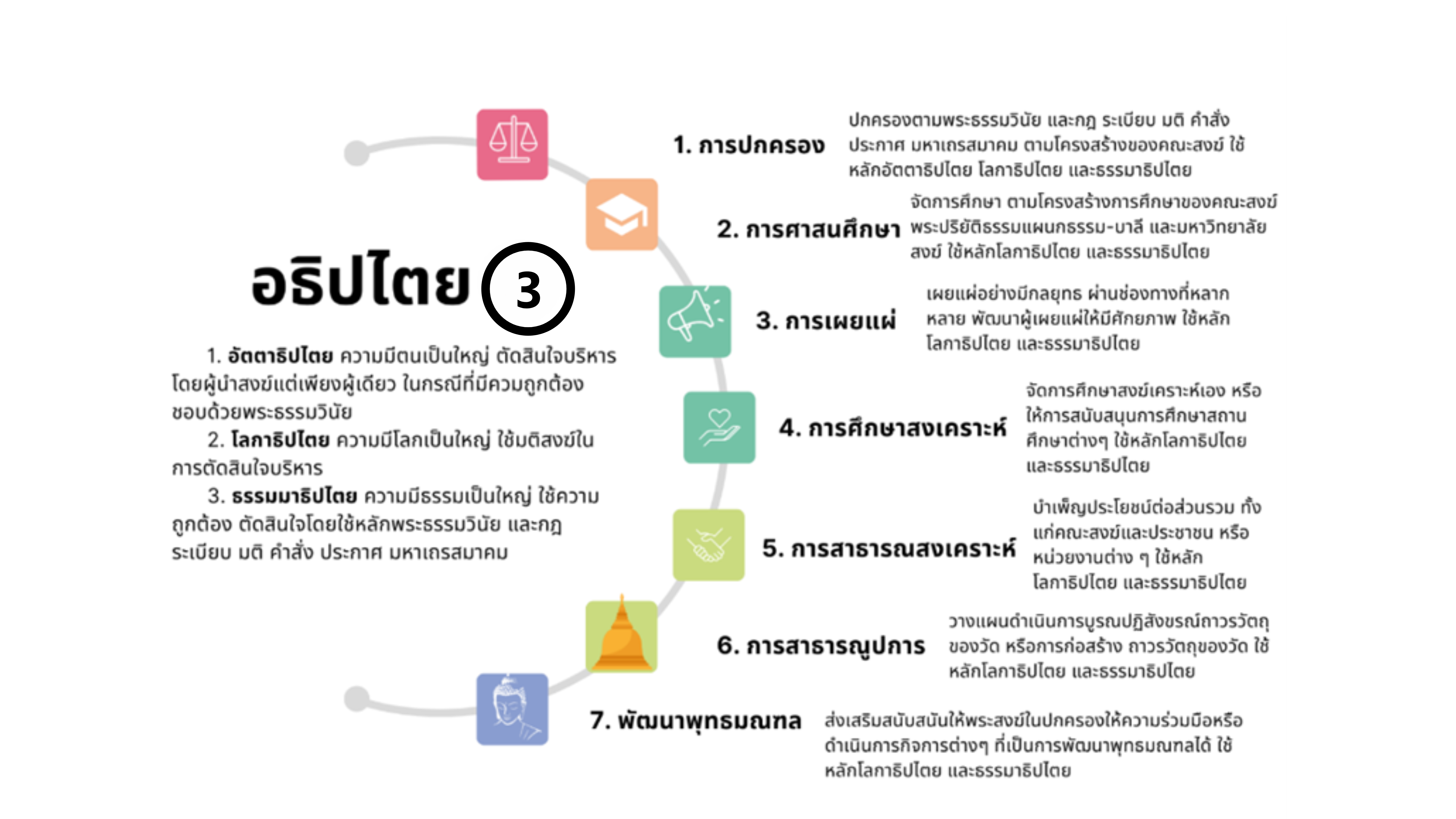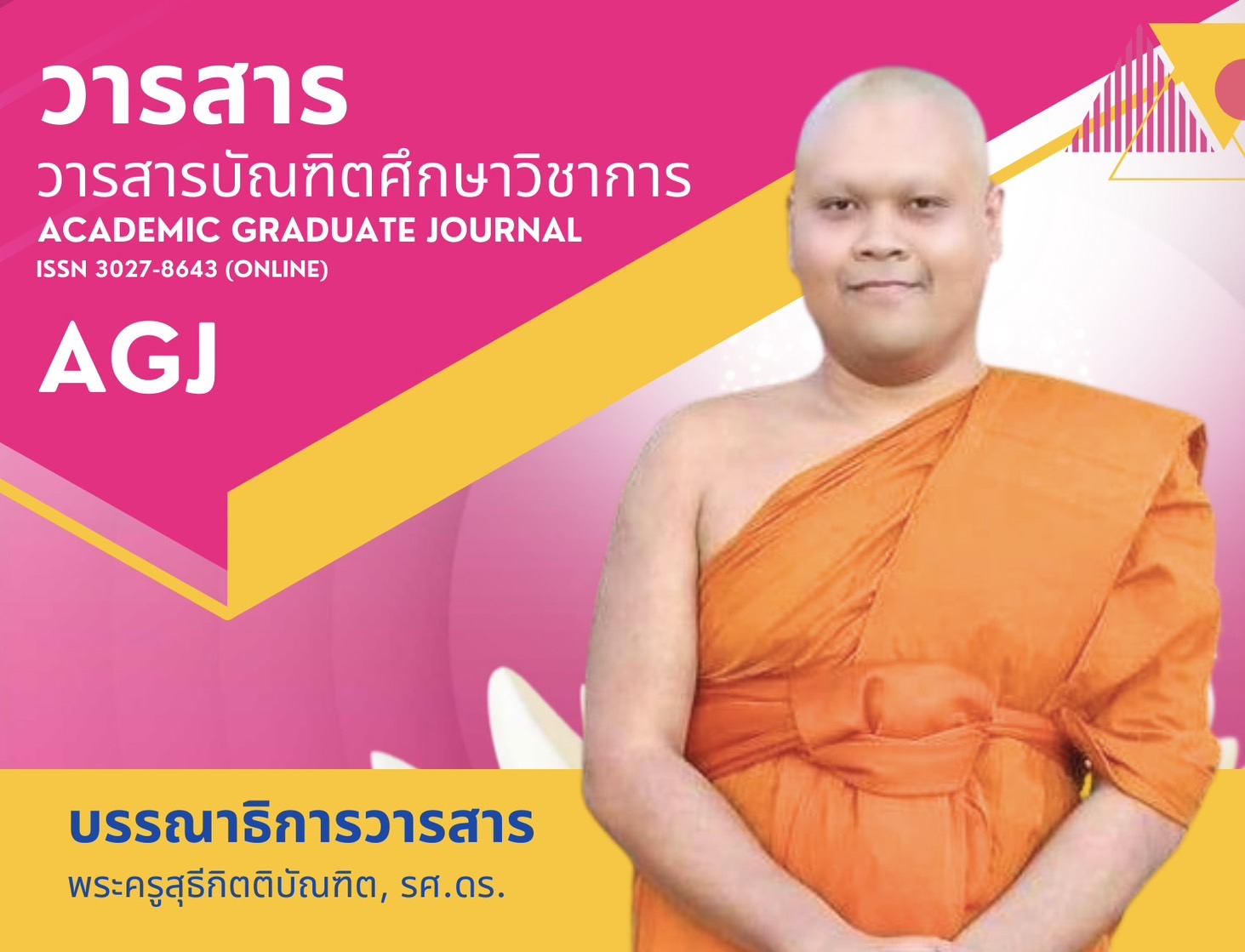THAI SANGHA ADMINISTRATION ACCORDING TO THREE ADHIPATEYYA
Keywords:
Administration, Sangha Administration, Three AdhipateyyaAbstract
This academic article aimed to study the administration of the Sangha according to the principle of Three Adhipateyya, to propose the guidelines for Sangha administration according to the principle of Three Adhipateyya. The administration of the Thai Sangha consists of 6 aspects: 1. Administration 2. Education 3. Propagation 4. Educational assistance 5. Public assistance 6. Construction and Plus 1: Buddha-Monthon development. The administration of the Sangha was under the authority of the abbot. Therefore, the abbot was the one who made decisions on selecting appropriate activities for the administration of the Sangha. Therefore, the application of the Three Adhipateyya principle for the administration of the Sangha was a good guideline that could support and promote the administration of the Sangha to be more efficient. The guidelines for using the principle of Adhipateyya were: Using the principle of Attadhipateyya in cases of activities or practices were already correct and appropriate. Using the principle of Lokadhipateyya in cases of a majority vote was required or administration with participation in listening to opinions from all sector and legitimate voting. Using the principle of Dhammathipateyya in cases of conflicts or disputes among the Sangha need to be resolved and general administration. Administration of the Sangha by applying these three principles of Adhipateyya will result in efficient administration of the Sangha.
References
จันทรานี สงวนนาม. (2545). ทฤษฎีและแนวปฏิบัติในการบริหารสถานศึกษา. กรุงเทพฯ: บุ๊คพอยท์.
ปราชญา กล้าผจญ และสมศักดิ์ คงเที่ยง. (2545). หลักและทฤษฎีการบริหารการศึกษา. กรุงเทพฯ: บพิธการพิมพ์.
พนัส หันนาคินทร์. (2542). ประสบการณ์ในงานบริหารบุคลากร. กรุงเทพฯ: จุฬาลงกรณ์มหาวิทยาลัย.
พระธรรมโกศาจารย์ (ประยูร ธมฺมจิตฺโต). (2549). พุทธวิธีในการบริหาร. กรุงเทพฯ : โรงพิมพ์มหาจุฬาลงกรณราชวิทยาลัย.
พระพุทธโฆษาจารย์ (ป. อ. ปยุตฺโต). (2564). พจนานุกรมฉบับประมวลธรรม. กรุงเทพฯ: มูลนิธิการศึกษาเพื่อสันติภาพ พระธรรมปิฎก (ป.อ. ปยุตฺโต).
พระราชบัญญัติคณะสงฆ์ (ฉบับที่ 2) พ.ศ. 2535. (2535, 25 กุมภาพันธ์). ราชกิจจานุเบกษา. เล่ม 109 ตอนที่ 16 หน้า 7.
มหาจุฬาลงกรณราชวิทยาลัย. (2539). พระไตรปิฎกภาษาไทย ฉบับมหาจุฬาลงกรณราชวิทยาลัย. กรุงเทพฯ: โรงพิมพ์มหาจุฬาลงกรณราชวิทยาลัย.
มหาเถรสมาคม. (2564). กลุ่มงานภายใน. สืบค้น 20 กรกฎาคม 2567, จาก https://www.mahathera.org/index.php?url=content2&id=3.
ราชบัณฑิตยสถาน. (2556). พจนานุกรม ฉบับราชบัณฑิตยสถาน พ.ศ. 2554. กรุงเทพฯ: ราชบัณฑิตยสถาน.
วิโรจน์ สารรัตนะ. (2545). การบริหารหลักการทฤษฎีและประเด็นการศึกษา. กรุงเทพฯ: ทิพยวิสุทธิ์.
สนิท ศรีสำแดง. (2544). ปรัชญาเถรวาท. กรุงเทพฯ: โรงพิมพ์มหาจุฬาลงกรณราชวิทยาลัย.
สมพงษ์ เกษมสิน. (2542). การบริหาร. กรุงเทพฯ: ไทยวัฒนาพานิช.
สำนักงานพระพุทธศาสนาแห่งชาติ. (2567). การปกครองคณะสงฆ์ไทย. สืบค้น 20 กรกฎาคม 2567, จาก https://www.onab.go.th/th/content/category/detail/id/57/iid/2474.
_________. (2567). จำนวนวัดในประเทศ. สืบค้น 20 กรกฎาคม 2567, จาก https://www.onab.go.th/th/content/category/detail/id/805/iid/9906.
Deming, W.E. (1986). Out of the crisis. Cambridge: Massachusetts Institute of Technology, Center for Advanced Engineering Study.
Holt, D.H. (1993). Management Principles and Practices. New Jersey: Prentice Hall.
Wagner, J.A. & Hollenbeck, J.R. (1995). Management of Organization Behavior. New Jersey: Prentice – Hall.







